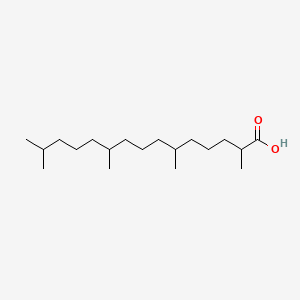m6A-centered Drug Response Information
General Information of the Drug (ID: M6APDG00554)
| Name |
pristanic acid
|
||||
|---|---|---|---|---|---|
| Synonyms |
UNII-6P06977L1A; 6P06977L1A; (2S,6R,10R)-2,6,10,14-tetramethylpentadecanoic acid; L,d,D-pristanic acid; GTPL2676; Pristanic acid, (2S,6R,10R)-; UNII-5FMQ2908AP component PAHGJZDQXIOYTH-KURKYZTESA-N; Pentadecanoic acid, 2,6,10,14-tetramethyl-, (2S,6R,10R)-
Click to Show/Hide
|
||||
| Status |
Investigative
|
||||
| Structure |
 |
||||
| Formula |
C19H38O2
|
||||
| InChI |
1S/C19H38O2/c1-15(2)9-6-10-16(3)11-7-12-17(4)13-8-14-18(5)19(20)21/h15-18H,6-14H2,1-5H3,(H,20,21)
|
||||
| InChIKey |
PAHGJZDQXIOYTH-UHFFFAOYSA-N
|
||||
| PubChem CID | |||||
| TTD Drug ID | |||||
Target Gene(s) and Their Upstream m6A Regulator, Together with the Effect of Target Gene(s) in Drug Response
The target genes involved in drug-target interaction (such as drug-metabolizing enzymes, drug transporters and therapeutic targets) and drug-mediated cell death signaling (including modulating DNA damage and repair capacity, escaping from drug-induced apoptosis, autophagy, cellular metabolic reprogramming, oncogenic bypass signaling, cell microenvironment, cell stemness, etc.) could be regulated by m6A regulator(s) and affected their corresponding drug response. You can browse detailed information on drug-related target gene(s) mediated by m6A regulators.
Peroxisome proliferator-activated receptor alpha (PPARA)
Fat mass and obesity-associated protein (FTO)
| In total 1 mechanisms lead to this potential drug response | ||||
| Response Summary | Peroxisome proliferator-activated receptor alpha (PPARA) is a therapeutic target for pristanic acid. The Fat mass and obesity-associated protein (FTO) has potential in affecting the response of pristanic acid through regulating the expression of Peroxisome proliferator-activated receptor alpha (PPARA). | [1], [2] | ||
Methyltransferase-like 14 (METTL14)
| In total 1 mechanisms lead to this potential drug response | ||||
| Response Summary | Peroxisome proliferator-activated receptor alpha (PPARA) is a therapeutic target for pristanic acid. The Methyltransferase-like 14 (METTL14) has potential in affecting the response of pristanic acid through regulating the expression of Peroxisome proliferator-activated receptor alpha (PPARA). | [2], [3] | ||
Methyltransferase-like 3 (METTL3)
| In total 1 mechanisms lead to this potential drug response | ||||
| Response Summary | Peroxisome proliferator-activated receptor alpha (PPARA) is a therapeutic target for pristanic acid. The Methyltransferase-like 3 (METTL3) has potential in affecting the response of pristanic acid through regulating the expression of Peroxisome proliferator-activated receptor alpha (PPARA). | [2], [4] | ||
Wilms tumor 1-associating protein (WTAP)
| In total 1 mechanisms lead to this potential drug response | ||||
| Response Summary | Peroxisome proliferator-activated receptor alpha (PPARA) is a therapeutic target for pristanic acid. The Wilms tumor 1-associating protein (WTAP) has potential in affecting the response of pristanic acid through regulating the expression of Peroxisome proliferator-activated receptor alpha (PPARA). | [2], [3] | ||
YTH domain-containing family protein 2 (YTHDF2)
| In total 1 mechanisms lead to this potential drug response | ||||
| Response Summary | Peroxisome proliferator-activated receptor alpha (PPARA) is a therapeutic target for pristanic acid. The YTH domain-containing family protein 2 (YTHDF2) has potential in affecting the response of pristanic acid through regulating the expression of Peroxisome proliferator-activated receptor alpha (PPARA). | [2], [4] | ||
References